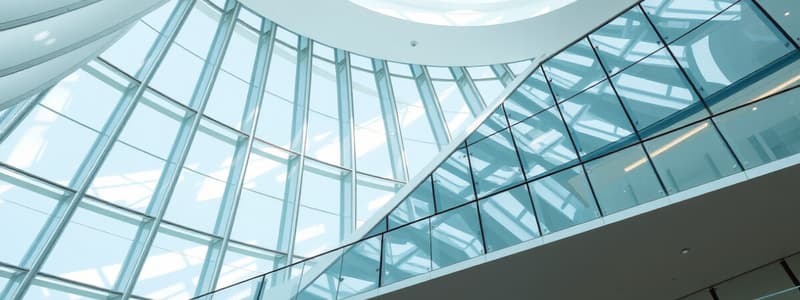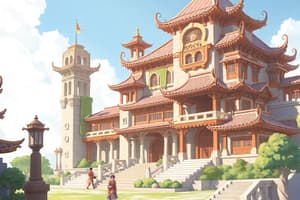Podcast
Questions and Answers
Which color is associated with feelings of warmth and security?
Which color is associated with feelings of warmth and security?
- White
- Brown (correct)
- Orange
- Gray
What is a negative association commonly linked with the color orange?
What is a negative association commonly linked with the color orange?
- Boring
- Cold
- Intrusive (correct)
- Stale
Which color is described as disconcerting when used alone?
Which color is described as disconcerting when used alone?
- Purple
- Blue
- Gray (correct)
- Brown
What is the overall effect of purple as described?
What is the overall effect of purple as described?
Which character trait is associated with the color brown?
Which character trait is associated with the color brown?
What might indicate a space that appears 'cheap' when associated with orange?
What might indicate a space that appears 'cheap' when associated with orange?
Which color is viewed as having a neutral to boring perception?
Which color is viewed as having a neutral to boring perception?
Which combination should be avoided to overcome the oppressive character of dark brown?
Which combination should be avoided to overcome the oppressive character of dark brown?
What is the primary concern when selecting artificial lighting for industrial interiors?
What is the primary concern when selecting artificial lighting for industrial interiors?
In institutional interior design, which aspect is prioritized to create a welcoming environment?
In institutional interior design, which aspect is prioritized to create a welcoming environment?
What should be avoided in educational environments to maintain a conducive learning atmosphere?
What should be avoided in educational environments to maintain a conducive learning atmosphere?
Which color theory involves two opposite colors along with black and white?
Which color theory involves two opposite colors along with black and white?
What does the Bezold Effect illustrate about our perception of color?
What does the Bezold Effect illustrate about our perception of color?
What does the principle of firmitas refer to in architecture?
What does the principle of firmitas refer to in architecture?
Which type of balance is exemplified by the Taj Mahal?
Which type of balance is exemplified by the Taj Mahal?
Which element does NOT contribute to the concept of emphasis in architectural design?
Which element does NOT contribute to the concept of emphasis in architectural design?
In architectural design, what is meant by contrast?
In architectural design, what is meant by contrast?
What ratio is known as the Golden Mean in proportion and scale?
What ratio is known as the Golden Mean in proportion and scale?
Which type of rhythm is characterized by a repetitive pattern that is consistent and predictable?
Which type of rhythm is characterized by a repetitive pattern that is consistent and predictable?
What aspect of architecture does the term 'movement' describe?
What aspect of architecture does the term 'movement' describe?
The perception of color in architecture can influence which of the following?
The perception of color in architecture can influence which of the following?
What psychological quality is frequently associated with the color red?
What psychological quality is frequently associated with the color red?
Which color is associated with cheerful and uplifting effects?
Which color is associated with cheerful and uplifting effects?
What is a common negative association with the color yellow?
What is a common negative association with the color yellow?
What is the effect that orange is suggested to have in design?
What is the effect that orange is suggested to have in design?
What characteristic makes red a dynamic color in visual perception?
What characteristic makes red a dynamic color in visual perception?
Which color is now preferred over red for marking hazards, particularly in safety contexts?
Which color is now preferred over red for marking hazards, particularly in safety contexts?
What overall mood does the color yellow typically convey?
What overall mood does the color yellow typically convey?
What aspect of color psychology did Faber Birren significantly contribute to?
What aspect of color psychology did Faber Birren significantly contribute to?
What effect does the color blue have on a person's physiological state?
What effect does the color blue have on a person's physiological state?
Which color is identified as the most restful for the eyes?
Which color is identified as the most restful for the eyes?
What is a negative association commonly linked with the color green?
What is a negative association commonly linked with the color green?
How is the color pink typically characterized?
How is the color pink typically characterized?
What type of atmosphere can black create in an architectural context?
What type of atmosphere can black create in an architectural context?
Which color association is negative for the character of color in residential settings?
Which color association is negative for the character of color in residential settings?
What is the primary goal of color selection in commercial installations?
What is the primary goal of color selection in commercial installations?
What should be considered when choosing colors for a residential area?
What should be considered when choosing colors for a residential area?
Flashcards are hidden until you start studying
Study Notes
Architectural Design Principles
- Architecture defined as everything an architect designs, focusing on utility, structure, and beauty.
- Utilitas (Utility): Emphasizes the practical and social aspects of architecture.
- Firmitas (Structure): Focuses on the durability and objective strength of buildings.
- Venustas (Beauty): Explores the subjective delight found in architectural design.
Visual Design Principles
-
Balance: Equal distribution of elements for stability.
- Symmetrical balance exemplified by the Taj Mahal in India.
- Asymmetrical balance illustrated by Robie House in Chicago.
- Radial balance seen in Galleria Vittorio Emanuele II, Milan.
- Vertical and horizontal balances represented by L'Oceanogràfic in Valencia and Chi Lin Temple in Hong Kong, respectively.
-
Rhythm/Repetition: Utilizes repeated elements for visual flow.
- Regular rhythm shown in Cube House, Rotterdam.
- Random rhythm in Saint Basil's Cathedral, Moscow.
- Gradated rhythm seen in Sun Pagoda, Guangxi.
-
Emphasis: Draws attention to focal points through size, placement, and shape.
- Centralized locations and contrasting geometric forms enhance emphasis.
-
Proportion and Scale: Establishes relationships between design elements; the 3:5 ratio known as the Golden Mean.
-
Movement: Conveys a sense of action and flow within the design.
-
Contrast: Achieved through differences in color, shape, and texture to create visual interest.
-
Unity: Consistency in design elements fosters a cohesive appearance.
Color Perception in Architecture
- Colors significantly influence psychological and physiological responses, creating ambiance.
- Understanding color perception aids designers in crafting supportive spaces.
- Faber Birren’s Contributions:
- Father of Applied Color Psychology.
- Established OSHA colors and professional color consulting.
Effects of Specific Colors
- Red: Aggressive, associated with vitality or violence; stimulates excitement.
- Yellow: Cheerful and attention-demanding; can be stimulating or upsetting.
- Orange: Stimulating, positive (extroverted) but can be overwhelming in large amounts.
- Brown: Restful, evokes warmth; if used alone may feel heavy.
- Gray: Neutral, can feel cold or boring; often lacks psychotherapeutic benefits.
- White: Clean and bright but may evoke sterility or emptiness.
- Purple: Soothing, suggests dignity; can be perceived as melancholic.
- Blue: Calming, helps concentration; can induce feelings of sadness or coldness.
- Green: Refreshing and tranquil; symbolizes nature, but can connote mold or illness.
- Pink: Varied effects from lively to calming; often feminine.
- Black: Ominous, represents depth and abstraction; can feel oppressive.
Color Usage in Different Environments
- Residential: Family-friendly colors accommodating varying tastes.
- Commercial: Rich and harmonious colors enhancing occupant wellbeing and efficiency.
- Industrial: Considers artificial lighting effects on colors; avoids shadows and glare.
- Institutional: Creates inviting atmospheres, crucial for patient and staff environments.
- Educational: Balance between stimulation and avoiding overstimulation to support learning.
Bezold Effect
- Describes how color perception changes based on surrounding colors.
- Impact on uniform versus non-uniform backgrounds and lightness perception.
Color Theory Frameworks
- Monochrome: One color with black and white.
- Complimentary: Opposite color pairs with black and white.
- Analogous: Three adjacent colors with black and white.
- Split Complementary: One color with two neighboring opposite colors plus black and white.
- Double Split Complementary: Two colors beside their opposites with black and white.
- Triadic: Three equally spaced colors with black and white.
Studying That Suits You
Use AI to generate personalized quizzes and flashcards to suit your learning preferences.




